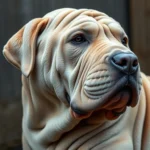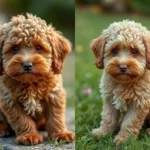
Introduction
Dogs are one of humanity’s oldest companions, with various breeds tailored to specific roles, from herding sheep to providing companionship. Understanding different dog breeds is crucial for potential owners, as each breed comes with unique characteristics, temperaments, and care requirements. In this article, we will delve into the fascinating world of the Rhodesian Ridgeback Beagle, exploring its history, physical traits, behavior, and care needs.
Understanding Dog Breeds
Definition of Dog Breeds
A dog breed is a specific strain of domesticated dogs with distinct characteristics that set them apart from others. This classification is based on various factors, including physical attributes, temperament, and purpose. Understanding these characteristics is vital for dog ownership, as they influence training methods, exercise needs, and health considerations.
Factors Influencing Dog Breeds
Several factors influence the development of dog breeds:
- Genetics: The genetic makeup of a breed determines physical traits, health predispositions, and temperament.
- Environment: The environment in which dogs are raised significantly affects their behavior and socialization.
- Breeding Practices: Responsible breeding practices focus on enhancing desirable traits while minimizing health issues.
The Rhodesian Ridgeback
History and Origin
The Rhodesian Ridgeback originated in Southern Africa, bred by the Khoikhoi people and later refined by European settlers. These dogs were initially used for hunting large game, including lions, due to their strength, speed, and courage. The breed was recognized for its unique ridge of hair along its back, which became a hallmark of its identity. Today, the Rhodesian Ridgeback is known not only for its hunting prowess but also for its loyalty and companionship.
Physical Characteristics
- Size and Weight: Rhodesian Ridgebacks are large dogs, typically weighing between 70 to 85 pounds and standing about 24 to 27 inches tall at the shoulder.
- Coat Color and Texture: Their coat is short, dense, and comes in shades of wheaten, light red, or brown.
- Distinctive Ridge Feature: The most notable feature of the Rhodesian Ridgeback is the ridge of hair that grows against the direction of the rest of the coat, running down its back.
Temperament and Behavior
Rhodesian Ridgebacks are known for their friendly yet independent nature. Their temperament includes:
- General Temperament Traits: They are loyal, affectionate, and protective, making them excellent family pets.
- Energy Levels and Activity Needs: These dogs are high-energy and require regular exercise to prevent boredom and behavioral issues.
- Social Behavior: They typically get along well with children and can be socialized to live with other pets, though they might exhibit prey drive due to their hunting background.
Health Considerations
While generally healthy, Rhodesian Ridgebacks are prone to certain health issues:
- Common Health Issues: Hip dysplasia, skin conditions, and certain types of cancer are more prevalent in this breed.
- Lifespan and Veterinary Care: They typically live between 10 to 12 years. Regular veterinary check-ups and a balanced diet can help maintain their health.
The Beagle
History and Origin
The Beagle is one of the oldest breeds of hounds, dating back to ancient times. Originally bred for hunting small game like rabbits and hares, Beagles have a keen sense of smell and strong tracking instincts. Their friendly disposition has made them popular as family pets and companions.
Physical Characteristics
- Size and Weight: Beagles are medium-sized dogs, weighing between 20 to 30 pounds and standing about 13 to 15 inches tall.
- Coat Colors and Patterns: They have short, easy-to-maintain coats that can come in various colors, including tri-color (black, white, and brown), lemon, and red.
- Distinctive Features: Beagles are known for their large, floppy ears and expressive faces, which contribute to their charm.
Temperament and Behavior
Beagles are renowned for their friendly and curious demeanor. Key traits include:
- General Temperament Traits: They are affectionate, playful, and often exhibit a strong desire to be around people.
- Energy Levels and Exercise Requirements: Beagles are energetic and require daily exercise to keep them happy and healthy.
- Social Behavior: They tend to be sociable with both humans and other dogs, making them excellent companions in multi-pet households.
Health Considerations
Beagles, like any breed, have their health concerns:
- Common Health Issues: They are prone to obesity, ear infections, and certain genetic disorders.
- Lifespan and Veterinary Care: Beagles generally live between 12 to 15 years. Regular veterinary visits and attention to diet are essential.
The Rhodesian Ridgeback Beagle Mix
Overview of the Mix
The Rhodesian Ridgeback Beagle Mix is a hybrid breed that combines the traits of both parent breeds. Mixed breeds often inherit a blend of characteristics, making them unique in appearance and temperament. This mix has gained popularity due to its potential for being a loyal companion with varied energy levels.
Physical Characteristics of the Mix
- Size and Appearance Variations: The size of a Rhodesian Ridgeback Beagle mix can vary, but they typically range from 30 to 70 pounds, depending on which parent they take after more.
- Coat Color Possibilities: The coat may inherit the short, dense quality of both breeds, with color variations ranging from the rich wheaten of the Rhodesian Ridgeback to the tri-color patterns of the Beagle.
Temperament and Behavior of the Mix
The temperament of the Rhodesian Ridgeback Beagle mix can be quite diverse, influenced by both parent breeds:
- Expected Traits from Both Parent Breeds: They may exhibit the friendliness and playfulness of the Beagle along with the loyalty and protectiveness of the Rhodesian Ridgeback.
- Potential Challenges in Training and Behavior: Training this mix may require patience, as they can inherit stubborn traits from both parent breeds. Early socialization and consistent training are key.
Health Considerations for the Mix
While mixed breeds may benefit from hybrid vigor, they can still inherit health issues from both parents:
- Potential Health Issues: Common concerns may include hip dysplasia, obesity, and certain genetic conditions associated with either breed.
- Importance of Regular Veterinary Check-ups: Regular vet visits are crucial for maintaining their health and addressing any issues early on.
Care and Training
Training a Rhodesian Ridgeback Beagle
Training a Rhodesian Ridgeback Beagle requires a thoughtful approach:
- Effective Training Techniques: Positive reinforcement methods work best, utilizing treats and praise to encourage desired behaviors.
- Socialization Needs: Early socialization is essential to develop a well-rounded dog that is comfortable in various environments and with different people and pets.
- Common Behavioral Issues and Solutions: Challenges may include stubbornness and prey drive; consistent training and mental stimulation can mitigate these issues.
Exercise and Activity Requirements
Both parent breeds have high energy levels, so regular exercise is vital:
- Recommended Exercise Routines: Daily walks, playtime in a secure area, and engaging activities like fetch or agility training can help keep them active.
- Importance of Mental Stimulation: Puzzle toys, obedience training, and interactive games are great ways to challenge their minds.
Grooming Needs
The grooming needs of the mix are relatively straightforward:
- Coat Care for the Mix: Regular brushing helps minimize shedding and keeps the coat healthy. The frequency will depend on the inherited coat type.
- Bathing and Grooming Frequency: Bathing should be done as needed, typically every few months or when they get particularly dirty.
Choosing the Right Dog for You
Assessing Your Lifestyle
Choosing the right dog requires careful consideration of your lifestyle:
- Importance of Matching Breed Characteristics with Lifestyle: Evaluate your activity level, living situation, and time availability to ensure a good fit.
- Time Commitment and Activity Level: Both the Rhodesian Ridgeback and Beagle mix require a commitment to regular exercise and socialization.
Adoption vs. Breeding
Deciding whether to adopt or go through a breeder involves weighing the pros and cons:
- Pros and Cons of Adopting a Mixed Breed: Adoption can provide a loving home to a dog in need and often comes at a lower cost, but the mixed breed may come with unknown health issues.
- Considerations When Choosing a Breeder: If opting for a breeder, ensure they are reputable and prioritize the health and well-being of their dogs.
Questions to Ask Before Getting a Rhodesian Ridgeback Beagle
Before bringing a Rhodesian Ridgeback Beagle mix into your home, consider this checklist:
- What is the temperament of the dog?
- What are the expected health issues?
- What is the dog’s exercise and grooming needs?
- How well does the dog socialize with other pets and children?
Conclusion
The Rhodesian Ridgeback Beagle mix offers a unique blend of traits from two beloved breeds. Understanding their characteristics, care needs, and potential challenges is essential for responsible pet ownership. This mix can make a loyal companion and a great addition to any family, provided that their needs for exercise, training, and socialization are met.
Choosing the right dog is a significant decision, and by considering the attributes of the Rhodesian Ridgeback Beagle mix, you can make an informed choice that will lead to a fulfilling relationship for both you and your new furry friend.








